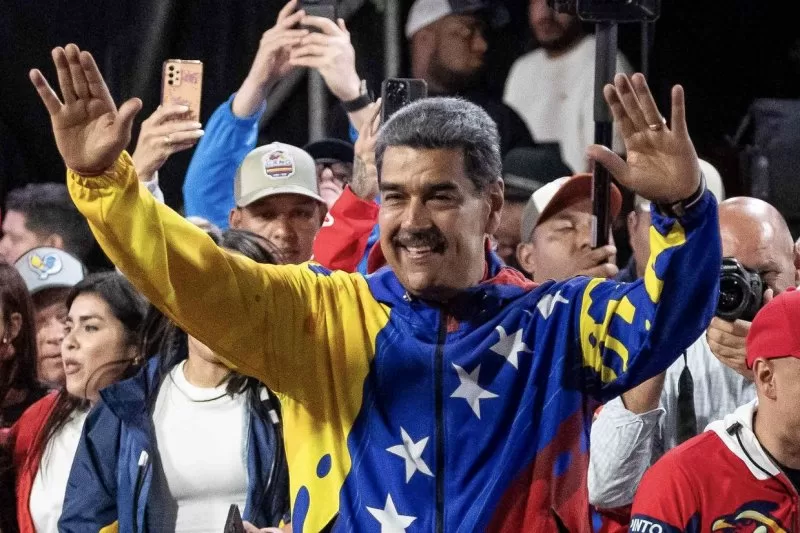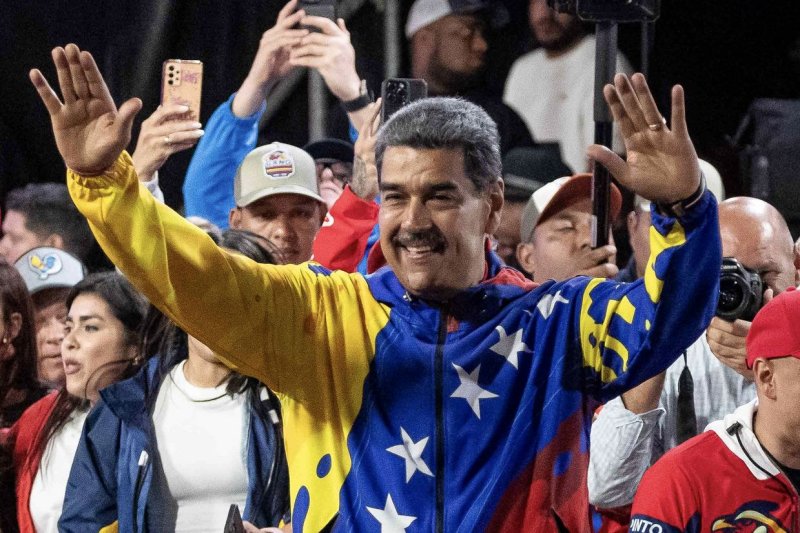Venezuelan President Nicolas Maduro (C) celebrates after partial results were announced by the electoral council, in Caracas, Venezuela, on Monday. Photo by Ronald Pena/EPA-EFE
July 29 (UPI) — Venezuela’s authoritarian leader Nicolas Maduro has been declared the winner of Sunday’s presidential election, despite polls showing the opposition held a wide lead and concerns over potential irregularities.
With 80% of ballots counted, the Venezuela National Electoral Council said early Monday that Maduro was elected to a third term in office with 51.20% of the vote. Main opposition Edmundo Gonzalez had 44%.
Of the electoral public, 59% cast ballots, according to the election council.
The Maduro regime and his ruling United Socialist Party of Venezuela have a history of winning elections deemed illegitimate by the Democratic world.
Maduro has been president of the South American country since Hugo Chavez died in 2013, and his re-election in 2018 was met with domestic and international condemnation for being illegitimate.
In response, mass and violent protests erupted, Venezuela was further isolated on the international stage and the United States under the Trump administration led a failed effort to unseat Maduro.
In the years that followed, negotiations were held, and the Maduro regime and the opposition came to an agreement in October of 2023 to hold elections this year.
However, questions remained about how legitimate the contest would be as opposition politicians had been arrested and disqualified from running. And in May, Maduro withdrew an invitation to European Union election observers, attracting concern from the United States.
Human Rights Watch has described the election as being “severely marred.”
Despite the obstacles and the contest being neither free nor fair, it still presented Venezuelans with “their best chance in over a decade to elect their government,” Juanita Goebertus, HRW’s Americas director, said in a statement ahead of Sunday.
Polls heading into the election presented by the Americas Society/Council of the Americas nonprofit show that Gonzalez was leading Maduro by a huge margin.
Gonzalez has rejected the CNE’s announcement.
In a news conference early Monday after the results were announced, he said they “will not rest until the people of Venezuela are respected.”
“The results are undeniable,” he added on X. “The country chose a peaceful change.”
Maria Corina Machado had swept the presidential primary to challenge Maduro in October but was was among those banned from office by the Maduro regime.
Beside Gonzalez during a press conference on Monday, Machado told reporters that they have established “a huge social movement that [the Maduro regime] will not stop.”
“We are a civic, peaceful movement and that is how we will keep working until we make the truth prevail and it will prevail,” she said.
U.S. Secretary of State Antony Blinken in Japan on Monday that they have seen the CNE’s announcement and “have serious concerns” that the result neither reflects the will of the voters or the actual votes cast.
“It’s critical that every vote be counted fairly and transparently, that election officials immediately share information with the opposition and independent observers without delay, and that the electoral authorities publish the detailed tabulation of votes,” he told reporters.
“The international community is watching this very closely and will respond accordingly.”
A day earlier, he had told reporters that they would not prejudge the election but said Venezuelans deserve an election that reflects their will without manipulation of interference.
“This is a pivotal event at a pivotal time given the severe political, humanitarian and economic crises the country faces,” he said.
On Sunday as the election was getting underway, U.S. Vice President Kamala Harris, who is also the presumptive Democratic presidential nominee, said on X that “the will of the Venezuelan people must be respected.”
“Despite the many challenges, we will continue to work toward a more democratic, prosperous, and secure future for the people of Venezuela,” she said.
Venezuela has faced an economic and humanitarian crisis since at least 2014.
According to the United Nations Refugee Agency, more than 7.7 million, representing 20% of the nation’s population, have fled the country.

